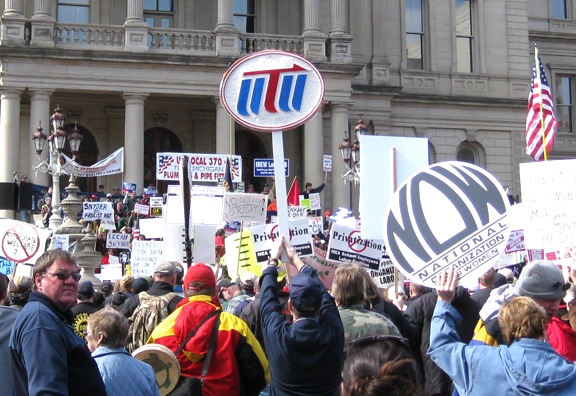Throughout America Monday, UTU members joined with brothers and sisters across craft and industrial lines in We Are One rallies reinforcing labor solidarity and raising public awareness of mean-spirited attacks on collective bargaining rights by right-wing extremists.
The word went forth that labor will not stand passive as anti-union zealots elected to state legislatures seek to dismantle public-employee unions through laws revoking collective bargaining rights, curtailing dues check-off and forcing costly annual representation elections.
There is an end-game: Reminding elected officials that organized labor remains a potent political force able to mobilize millions of voters, and to set the stage for recall elections of anti-union lawmakers and voter referendums to nullify the legislative assault on collective bargaining rights.
“The immense activity this week is a direct result of the backlash provoked by overreaching governors and legislators,” said AFL-CIO President Rich Trumka.
Labor leaders nationwide recognize that the assault on public-employee collective bargaining rights is part of a right-wing effort to extend the anti-union assault to private sector unions. Anti-union extremists already have urged an assault on Railroad Retirement Tier II and the Federal Employers Liability Act (FELA).
The UTU Collective Bargaining Defense Fund, established to help support public awareness of anti-union actions by right-wing extremists is just one example of union solidarity, being duplicated by dozens of other labor organizations in the public and private sectors.
Thousands of dollars already have been contributed to the UTU Collective Bargaining Defense Fund for this purpose, and UTU members and retirees are urged to add to the contributions already received from locals, general committees and state legislative boards.
In Ohio, where Gov. John Kasich signed into law a bill curtailing public-employee collective bargaining rights, the effort to nullify that law in a November voter referendum already has begun.
Over the next 90 days, union members and their supporters in Ohio will collect the necessary 231,000 signatures to put the Ohio legislation to a voter referendum in November.
Efforts also have begun in Wisconsin to recall legislators who voted in favor of curtailing public-employee collective bargaining rights in that state.
“If you believe in something strong enough, you fight for it,” said UTU International President Mike Futhey in urging donations to the UTU Collective Bargaining Defense Fund. “Together, in solidarity, we can and will win this fight and emerge stronger than ever.”
Checks to the UTU Collective Bargaining Defense Fund should be sent to:
UTU Collective Bargaining Defense Fund
United Transportation Union
Suite 340
24950 Country Club Blvd.
North Olmsted, OH 44070-5333
